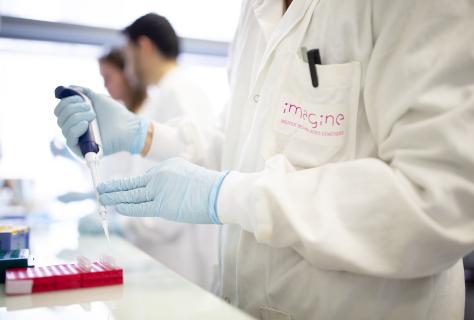Published on
We are not all equal when it comes to infections. Some people carry genetic alterations that put them at increased risk for germs. For example, it has been known for more than 25 years that genetic deficiencies around interferon gamma (IFN-ɣ) are responsible for the mycobacterial susceptibility syndrome (MSMD). This clinical entity is characterized by the occurrence of severe infections with mycobacteria of low virulence to the rest of the population, such as BCG vaccine.
IFN-ɣ, the great strategist of the response to mycobacterial infections
Jacinta Bustamante's group* is exploring the links between the pathways responsible for producing and inducing IFN-ɣ, whose role is to destroy mycobacteria, and this syndrome, which can notably cause the death of a child from BCG vaccination. In total, 30 genetic diseases involving more than 15 genes have already been uncovered: all of these genes controlled players in the IFN-ɣ-mediated immune response, but no defects affected the cytokine itself .... This was surprising.
IFN-ɣ is a key player in the immune system's response to mycobacterial infections. "It's not in the front line, because IFN-ɣ doesn't directly destroy the pathogen, but it sort of coordinates the defense reactions following a mycobacterial attack," explains Jacinta Bustamante.
From the first mutation of IFN-ɣ...
The research group led by Dr. Jacinta Bustamante, from the team of Prof. Jean-Laurent Casanova** and the team of Dr. Laurent Abel*** have identified and characterized a new disease. By analyzing the DNA of two cousins from Lebanon living in Kuwait with MSMD, the researchers identified the first mutation affecting the IFNG gene, which codes for the key cytokine of antimycobacterial immunity in humans. This new study was carried out through an international collaboration with doctors from Lebanon and Kuwait.
So why has a mutation in this gene at the heart of the response to mycobacterial infections taken so long to be discovered in patients with MSMD? "The rarity of the disease is probably related to the high selection pressure of this gene," says Jacinta Bustamante. Moreover, as Prof. Jean-Laurent Casanova likes to repeat, "patience and perseverance are needed because it is by analyzing all the patients around the world that we discover new genes involved in anti-infectious immunity.
... to therapeutic applications
This discovery also opens up therapeutic prospects for patients with this specific mutation, since they could benefit from a subcutaneous IFN-ɣ-based treatment, which already exists. For the physician-researcher's ultimate goal remains to use her dual expertise in medicine and science to more quickly understand what is happening in the clinic, and transfer it to the scientific level, and vice versa.
* Jacinta Bustamante* is a senior lecturer at Université de Paris and a researcher in the team "Human genetics of infectious diseases: monogenic predisposition" (Inserm/Institute Imagine) directed by Jean-Laurent Casanova, biologist at Hôpital Necker-Enfants Malades AP-HP.
**Jean-Laurent Casanova is a professor at Université de Paris/Hôpital Necker-Enfants Malades AP-HP and at the Rockefeller University in New York, and is also director of an Inserm research laboratory at Institut Imagine and the Howard Hughes Medical Institute in New York.
***Laurent Abel is co-founder of the Laboratory of Human Genetics of Infectious Diseases, an international Inserm laboratory organized in two branches, one at the Rockefeller in New York and the other at Institut Imagine.








